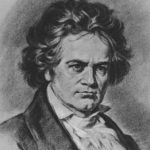Beethoven’s ‘Mass in C’, ‘Choral Fantasia’ & Coriolanus Overture.
A Saturday evening concert in Sunderland Minster.
Conducted by David Murray.
Soloists : Soprano – Katherine Moore, Alto – Sara Parry, Tenor – Edward Lee, Bass – Martin Robson, Piano – Eileen Bown.
Tickets are £12 in Nave (£6 concessions for full time students and UB40s), £8.00 in Gallery (with limited view) and accompanied children under 16 admitted free. Obtainable via this website or info@bishopwearmouth.co.uk and from online ticketing at http://wegottickets.com/BCS
 Beethoven wrote his Mass in C Major (Op.86) as a commission from Prince Nikolaus Esterházy in 1807. This continued a tradition established by Joseph Haydn who had composed one mass per year for the Esterházy family, from 1795 to his health failing in 1802, to celebrate the name day of the Prince’s wife, Maria. Although by this time his status as a composer was assured, Beethoven was less experienced in sacred music and had never before set the words of the Mass. He was to do so only once more, over a decade later, in the Missa Solemnis, which often overshadows this work.
Beethoven wrote his Mass in C Major (Op.86) as a commission from Prince Nikolaus Esterházy in 1807. This continued a tradition established by Joseph Haydn who had composed one mass per year for the Esterházy family, from 1795 to his health failing in 1802, to celebrate the name day of the Prince’s wife, Maria. Although by this time his status as a composer was assured, Beethoven was less experienced in sacred music and had never before set the words of the Mass. He was to do so only once more, over a decade later, in the Missa Solemnis, which often overshadows this work.
The Prince did not appreciate the mass and Beethoven left his house in a rage. Although still one of the least often performed of Beethoven’s larger works it is now recognised as a long underrated masterpiece.
The Choral Fantasy in C Minor for Piano, Chorus, and Orchestra (Op.80) was composed in 1808 and was written as the finale of a concert, which was to premiere his Fifth and Sixth Symphonies as well a performance of a portion of his C major Mass, to unite the different musical elements (piano solo, chorus, and orchestra) highlighted in the concert night. A poet was commissioned to write the words to fit the already written parts shortly before the performance.
At the first performance Beethoven himself played the piano part but the performance itself “simply fell apart” a result most likely attributable to insufficient rehearsal time.
His Coriolanus Overture Op. 62 was written in 1807 to Heinrich Joseph von Collin’s 1804 tragedy. The structure and themes of the overture follow the play very generally. The main C minor theme represents Coriolanus’ resolve and war-like tendencies, while the more tender E-flat major theme represents the pleadings of his mother to desist. Coriolanus eventually gives in to tenderness, but since he cannot turn back having led an army of his former enemies to Rome’s gates, he kills himself.




